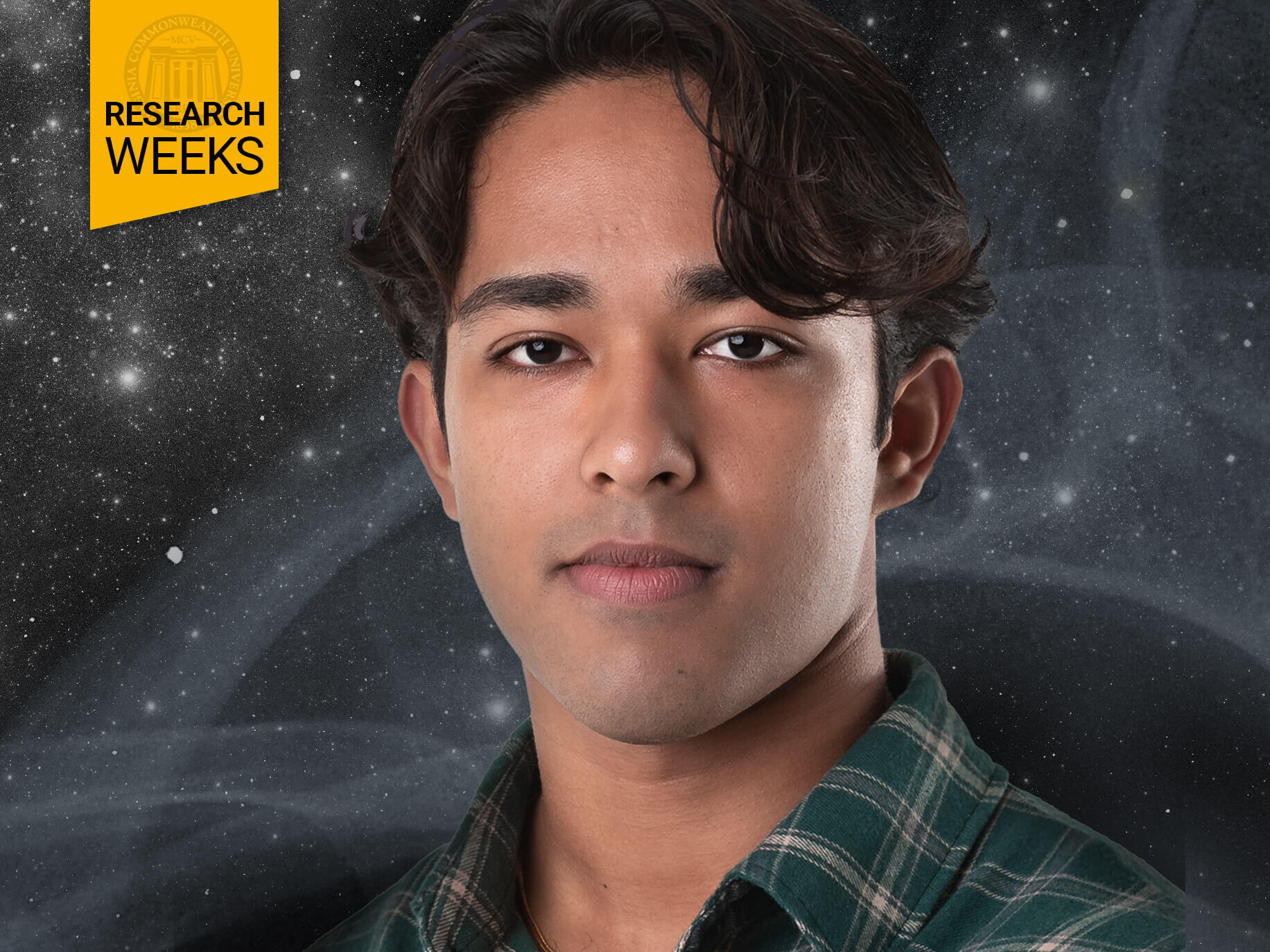
April 14, 2022
How do bones change in outer space? This chemistry major is doing research to find out
Share this story
As part of Research Weeks (March 17–April 29) we are highlighting some of the remarkable research done by undergraduates at VCU. Research Weeks features a wide variety of projects in multiple disciplines from across the university.
In Lovell Abraham’s first biomedical engineering class in the Virginia Commonwealth University College of Engineering, the professor, Henry Donahue, Ph.D., encouraged the students to get involved in research.
Abraham, who is now a junior, didn’t hesitate. Two years in, working in Donahue’s lab, the chemistry major in the College of Humanities and Sciences has been recognized for his contributions to a project looking at the effect of microgravity on bone fracture healing and winning awards for his work.
“When I found Dr. Donahue’s lab and learned about how he studies how bones are affected in space, that was a new challenge for me,” said Abraham, who saw connections to his own efforts in athletics, learning how to become faster as well as building muscle and musculoskeletal health studies. “That was really daunting and interesting. That’s what brought me into the lab and kept me there.”
Donahue, the Alice T. and William H. Goodwin Jr. Professor and Distinguished Chair of the Department of Biomedical Engineering and co-director of the VCU Institute for Engineering and Medicine, said his research, which is funded by NASA, pertains to astronauts who are experiencing microgravity in space but also people who are bedridden for long periods.
“We’re interested in why they lose bone. Bone loss that occurs with space travel is similar to age-related bone loss, which millions of people suffer from,” Donahue said. “Stuff we find out about, like disuse-related bone loss, will possibly lead to new therapeutics for age-related bone loss.”
Abraham is looking at a particular cell mechanism called gap junctional communication, where cells talk to one another. He’s asking whether inhibiting these gap junctions on disuse-induced bone loss actually protects bones. Postdoctoral research fellow Evan Buettmann, Ph.D., is leading Abraham in a project looking at how bone fractures heal after the bone has been exposed to disuse.
“We’re also interested in how re-ambulation after disuse and fracture helps to recover or make the fracture heal faster,” Donahue said.
With medical school aspirations in surgery, Abraham also is a member of the Tuckahoe Volunteer Rescue Squad in Henrico County, giving him a different kind of hands-on medical-focused experience.
“I’ve been able to apply the things I’ve learned from research into my personal life. At the Tuckahoe Volunteer Rescue Squad, where I do 911, I’m often faced with a situation where I don’t know the answer, and there’s no one higher up to tell me what to do. That’s where you take protocols and past experiences, just as you do in research, and fit them into new situations,” Abraham said. “We’re doing new research no one's done before. No one’s there to tell you what to do. So, you follow the old patterns to fit your situation. That’s easily the most valuable thing I learned from research.”
Using mice as a model, Abraham focused on Connexin-43, a gap junction protein that aids cell-to-cell communication in the bone.
“We think that when the bone is experiencing gravity, the Connexin-43 gap junction protein tells other cells, ‘Hey, there’s gravity right now.’ So, when the body is in space, the Connexin-43 gap junction protein doesn’t send that signal and what we’ve seen is that that causes these cells to shrink.”
Abraham’s hard work has paid off. After a year in the lab, he got a VCU Undergraduate Research Opportunities Program fellowship while continuing to forge ahead on his own project. He also was able to present his work at the VCU Undergraduate Research Symposium in the Engineering Department under the Dean’s Undergraduate Research Initiative and the UROP fellowships in the fall, earning an award for best poster in biomedical engineering. And he is presenting research at the Symposium for Undergraduate Research and Creative Inquiry this spring as well.
The lessons Abraham has learned in the lab go beyond the bench. As a mentor, Buettmann’s calm and levelheaded approach is an attitude Abraham said he wants to emulate in the future as a mentor himself.
“I would say my opportunity to do research as an undergrad has made me a more inquisitive person when it comes to approaching my undergraduate education,” Abraham said. “In many of my classes, especially laboratory classes, I am a lot more interested in learning the details of how something works rather than just the product or answer.
“In research, we often have to focus on the nuances of an experimental procedure to optimize for the most consistent yield based on our own understanding of biochemical pathways. This has benefited me by teaching me to enjoy the small details of materials I learn in classes and it makes it easier to be successful in the academic world.”
Subscribe to VCU News
Subscribe to VCU News at newsletter.vcu.edu and receive a selection of stories, videos, photos, news clips and event listings in your inbox.










